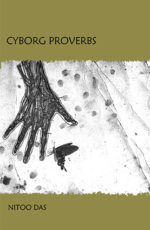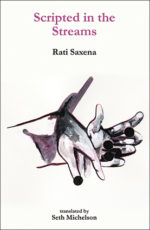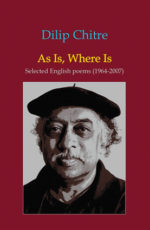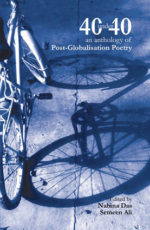| Author | |
|---|---|
| Imprint | |
| Publication Year | 2013 |
| Language | English |
| Edition | 1st |
| Binding | Paperback |
| Pages | 106 |
Brouhahas Of Cocks
$15
About the Book
Hardback awakening The air is thick, and has revived my books, anticipating the first spell of a Bombay monsoon. Ambient moisture has slaked pages that shuffle and twist, arise to a wakefulness, unleaving. Feeling the discomfort of nearness,
Related products
-
Cyborg Proverbs
$12Das’ poetry more than delivers on the promise made in the penultimate lines of her titular Cyborg Proverbs, offering its reader the gift of penetrating (in)sight through thoughts “as precise as suspicion”. Her syllables breathe aloud, like hushes that unassumingly gasp in the gaps between echoes, in the interstitial moments of alighting bird wings, or roots that braid the air, or the slipperiness of netted fish, and the gush of rain as it nestles its way into the crevices of walls and swells its way through its parasitical, residential act.
Das exquisitely reimagines syntax and her frequently anthropomorphic poems shape-shift upon each ensuing page, making Cyborg Proverbs an enviable feat, aided in no small measure by her studied, patient, bird-watcher gaze and her unspeakable lust for articulating the tacitly sensual.
-
Scripted in the Streams
$12About the Books
There is an intense humanity in these poems by Rati Saxena, a humanity that ennobles all of us who are humble enough to listen. There is an empathy is these poems for all living things – for the spider, for the ant, for the owl – and a similar understanding of all things that may not be alive. -Alan Titley, Professor Emeritus of Modern Irish, University College, Cork It has travelled a long, long way this voice?and we welcome it as we would do a stranger, into the West where despair, decline and decay are seemingly permanent lodgers, Saxena’s lyrics arrive like a fresh breeze. New-born, fresh and smelling of the earth, her poems draw on the well of Indo-European tradition, the intimate links that bind the female psyche and the landscape in all its fecundity. -Dr Michel h’Aodha, University of Limerick Saxena allows for different aeons to melt into each other. She creates a world in which humans interact with insects and animals. We are all of and from the same source. The image of the snake is a powerful one to explain the frustrations of modern women in today’s India. Her vision makes a mockery of the boundaries around our lives and we sail with her through a magical world, coming into contact with the source of life itself. There are echoes of Flann O’ Brien in the delightful poem about the bicycle of her youth. Taboos and rituals will not enslave her and poetry finds its way into the washing on the line and the fire that bakes our daily bread. – Ceaiti Ni Bheildiuin, poet In this selection of the poems of Rati Saxena we are drawn into a world of imagery where deep respect is shown for the low -Brian O Conchubhair, University of Notre Dame, USA
-
Says Tuka-Selected poems of Tukaram
$30About the Book
Tukaram was born in 1608 and vanished without a trace in 1650. what little we know of his life is a reconstruction from his own autobiographical poems, the contemporary poetess Bahinabai’s memoirs in verse, and the later biographer of Marathi poet-saints, Mahipati’s account. The rest is all folklore, though it cannot be dismissed on those grounds alone. Modern scholars such as the late V. S. Bendre have made arduous efforts to collate evidence from disparate contemporary sources to establish a well-researched biography of Tukaram. But even this is largely conjectural.
Tukaram is therefore not only the last great Bhakti poet in Marathi but he is also the first truly modern Marathi poet in terms of temper and thematic choice, technique and vision. He is certainly the most vital link between medieval and modern Marathi poetry. Tukaram’s stature in Marathi literature is comparable to that of Shakespeare in English or Goethe in German. He could be called the quintessential Marathi poet reflecting the genius of the language as well as its characteristic literary culture. There is no other Marathi writer who has so deeply and widely influenced Marathi literary culture since. Tukaram’s poetry has shaped the Marathi language, as it is spoken by 70 million people today and not just the literary language. Perhaps one should compare his influence with that of the King James version of the Bible upon speakers of the English language. For Tukaram’s poetry is also used by illiterate millions to voice their prayers or to express their love of God.
-
As Is, Where Is
$35About the Book
Lost Images (For Ashay) I am backing home where you died. One year later, to find Changes that mask our surrender To the inevitability of life. I remember my Ambulance Ride With my friend whom you called Daddy. It took me a whole year To under -
40 under 40
$5About the Book
“The Indian poetry scene has always been considered to be lively, but no better evidence of this fact exists than 40/40. Here we have forty contemporary Indian poets under forty years old, and what we encounter is extraordinarily timely and compelling, providing us the trace of a newly emergent lyric consciousness, simultaneously local and cosmopolitan. Here we have Akhil Katyal reminiscing about being ten years old and growing up in the shadow of the AIDS epidemic, “battling the stars of a virus”; we have Chandramohan S’ witty “Plus-Size Poem” that “does not opt for offshore liposuction”; and we have the speaker of Ishita Basu Mallik’s sonnenizio about going commando under her jeans and turning her beloved into ” an electric remnant bombarding” her “bones with wavelengths.” From Jennifer Robertson’s prose poem about Jesus and Jaipur, Rohan Chhetri’s universe in braille, or Shelly Bhoil’s typographical experimentation, this anthology shows us the pulse of a generation coming of age in an era of mass media and Hindu mythology. I have no doubt that this will be one of those books that when looked back on will have been proven to be seminal and indispensable, introducing us to both the present and the future of Indian poetry.” -Ravi Shankar, Pushcart Prize winning poet and Founding Editor of Drunken Boat * THIS ANTHOLOGY HAS BEEN EDITED BY NABINA DAS & SEMEEN ALI
-
The Metaphysics of the Tree-Frog’s Silence
$12About the Book
It is our loss that we did not know Ajithan Kurup’s work when he was alive, and we did not celebrate his brave and lonely project: to render the unsayable into language. He cannot be imitated or replaced, only admired.- Jeet Thayil
To enter Ajithan G. Kurup’s poetic world is to risk, in the words of his title poem, dancing “headlong down precipices.” It’s rare to find a contemporary poet who dares near-unattainable heights and fearful depths on dancing words – words that may sometimes seem far-fetched or invented but which, in fact, are inspired variants or archaic forms of those more usually used: “sempstress” instead of “seamstress”, “enow” instead of “enough”, “trode” instead of “trod”.-ADIL JUSSAWALLA
-
As Is, Where Is
$35About the Book
Lost Images (For Ashay) I am backing home where you died. One year later, to find Changes that mask our surrender To the inevitability of life. I remember my Ambulance Ride With my friend whom you called Daddy. It took me a whole year To under








